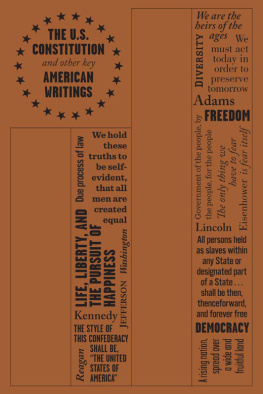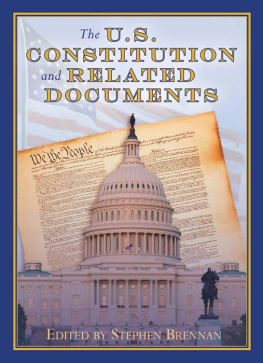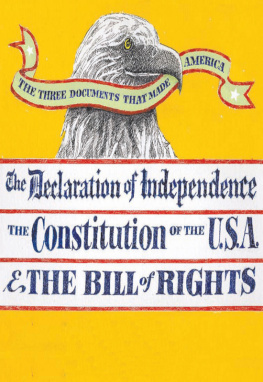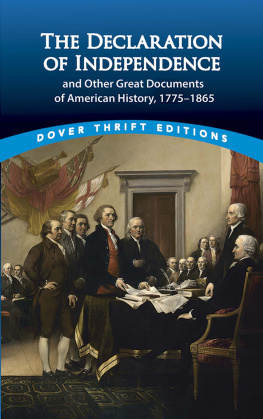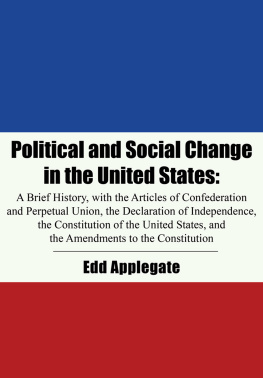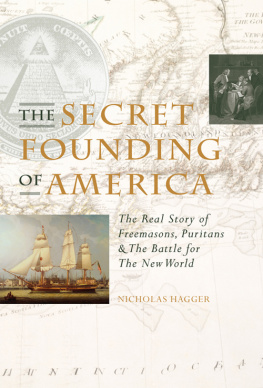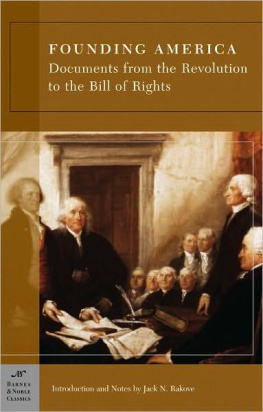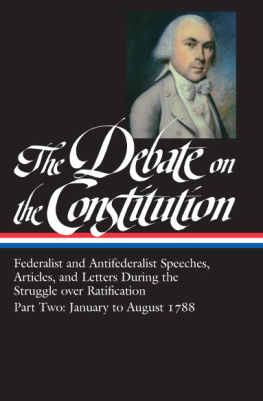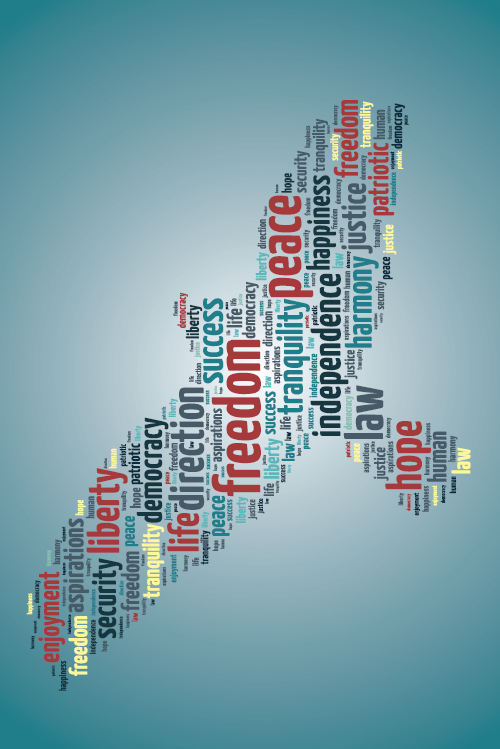All rights reserved. No part of this publication may be reproduced, distributed, or transmitted in any form or by any means, including photocopying, recording, or other electronic or mechanical methods, without the prior written permission of the publisher, except in the case of brief quotations embodied in critical reviews and certain other noncommercial uses permitted by copyright law.
Printers Row Publishing Group is a division of Readerlink Distribution Services, LLC. The Canterbury Classics and Word Cloud Classics names and logos are trademarks of Readerlink Distribution Services, LLC.
All correspondence concerning the content of this book should be addressed to Canterbury Classics, Editorial Department, at the above address.
THE MAYFLOWER COMPACT
(1620)
__________
The Mayflower Compact was the governing charter of the English colony at Plymouth in Massachusetts. John Carver, who helped to organize the Mayflower voyage and became the colonys first governor, likely wrote the compact, and it was signed by the colonys forty-one free, adult men.
I n the name of God, Amen. We, whose names are underwritten, the Loyal Subjects of our dread Sovereigne Lord, King James, by the Grace of God, of Great Britaine, France, and Ireland, King, Defender of the Faith, etc.
Having undertaken for the Glory of God, and Advancement of the Christian Faith, and the Honour of our King and Country, a Voyage to plant the first colony in the Northerne Parts of Virginia; doe, by these Presents, solemnly and mutually in the Presence of God and one of another, covenant and combine ourselves together into a civill Body Politick, for our better Ordering and Preservation, and Furtherance of the Ends aforesaid; And by Virtue hereof do enact, constitute, and frame, such just and equall Laws, Ordinances, Acts, Constitutions, and Offices, from time to time, as shall be thought most meete and convenient for the Generall Good of the Colony; unto which we promise all due Submission and Obedience.
In Witness whereof we have hereunto subscribed our names at Cape Cod the eleventh of November, in the Raigne of our Sovereigne Lord, King James of England, France, and Ireland, the eighteenth, and of Scotland, the fiftie-fourth, Anno. Domini, 1620.
GIVE ME LIBERTY,
OR GIVE ME DEATH! (1775)
__________
Founding Father Patrick Henry delivered this rousing speech to encourage the colony of Virginia to send troops to fight in the Revolutionary War. He was successful and in 1784 became the first governor of the new state of Virginia.
ST. JOHNS CHURCH
RICHMOND, VIRGINIA
N o man thinks more highly than I do of the patriotism, as well as abilities, of the very worthy gentlemen who have just addressed the House. But different men often see the same subject in different lights; and, therefore, I hope it will not be thought disrespectful to those gentlemen if, entertaining as I do, opinions of a character very opposite to theirs, I shall speak forth my sentiments freely, and without reserve. This is no time for ceremony. The question before the House is one of awful moment to this country. For my own part, I consider it as nothing less than a question of freedom or slavery; and in proportion to the magnitude of the subject ought to be the freedom of the debate. It is only in this way that we can hope to arrive at truth, and fulfill the great responsibility which we hold to God and our country. Should I keep back my opinions at such a time, through fear of giving offence, I should consider myself as guilty of treason towards my country, and of an act of disloyalty toward the majesty of heaven, which I revere above all earthly kings.
Mr. President, it is natural to man to indulge in the illusions of hope. We are apt to shut our eyes against a painful truth, and listen to the song of that siren till she transforms us into beasts. Is this the part of wise men, engaged in a great and arduous struggle for liberty? Are we disposed to be of the number of those who, having eyes, see not, and, having ears, hear not, the things which so nearly concern their temporal salvation? For my part, whatever anguish of spirit it may cost, I am willing to know the whole truth; to know the worst, and to provide for it.
I have but one lamp by which my feet are guided; and that is the lamp of experience. I know of no way of judging of the future but by the past. And judging by the past, I wish to know what there has been in the conduct of the British ministry for the last ten years, to justify those hopes with which gentlemen have been pleased to solace themselves, and the House. Is it that insidious smile with which our petition has been lately received? Trust it not, sir; it will prove a snare to your feet. Suffer not yourselves to be betrayed with a kiss. Ask yourselves how this gracious reception of our petition comports with these war-like preparations which cover our waters and darken our land. Are fleets and armies necessary to a work of love and reconciliation? Have we shown ourselves so unwilling to be reconciled, that force must be called in to win back our love? Let us not deceive ourselves, sir. These are the implements of war and subjugation; the last arguments to which kings resort. I ask, gentlemen, sir, what means this martial array, if its purpose be not to force us to submission? Can gentlemen assign any other possible motive for it? Has Great Britain any enemy, in this quarter of the world, to call for all this accumulation of navies and armies? No, sir, she has none. They are meant for us; they can be meant for no other. They are sent over to bind and rivet upon us those chains which the British ministry have been so long forging. And what have we to oppose to them? Shall we try argument? Sir, we have been trying that for the last ten years. Have we anything new to offer upon the subject? Nothing. We have held the subject up in every light of which it is capable; but it has been all in vain. Shall we resort to entreaty and humble supplication? What terms shall we find which have not been already exhausted? Let us not, I beseech you, sir, deceive ourselves. Sir, we have done everything that could be done to avert the storm which is now coming on. We have petitioned; we have remonstrated; we have supplicated; we have prostrated ourselves before the throne, and have implored its interposition to arrest the tyrannical hands of the ministry and Parliament. Our petitions have been slighted; our remonstrances have produced additional violence and insult; our supplications have been disregarded; and we have been spurned, with contempt, from the foot of the throne. In vain, after these things, may we indulge the fond hope of peace and reconciliation. There is no longer any room for hope. If we wish to be free if we mean to preserve inviolate those inestimable privileges for which we have been so long contending if we mean not basely to abandon the noble struggle in which we have been so long engaged, and which we have pledged ourselves never to abandon until the glorious object of our contest shall be obtained, we must fight! I repeat it, sir, we must fight! An appeal to arms and to the God of Hosts is all that is left us!

